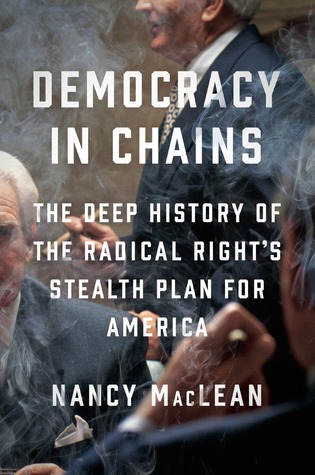It’s not often that an historian speaking to a church group ignites a controversy. But Nancy MacLean, a Duke University history professor, did exactly that when, in a recorded speech about her new book, Democracy in Chains: The Deep History of the Radical Right’s Stealth Plan for America, she suggested that libertarians—or at least a subset thereof—were on the autism spectrum.
The remark, which came during the Q&A earlier this month at a Unitarian congregation in New York City, went like this:
Question: Where do [Public Choice Theory economist James Buchanan’s] motivations lie? Are they ones of personal greed? It seems like it’s a little grander, is it malevolence?
MacLean: I have struggled with this, and I could explain it in different ways. I didn’t put this in the book, but I will say it here. It’s striking to me how many of the architects of this cause seem to be on the autism spectrum—you know, people who don’t feel solidarity or empathy with others, and who have difficult human relationships sometimes.
Before taking this remark to task—and libertarians, as you’d expect, have done so with vigor (James Buchanan was a libertarian leaning economist)—it’s worth noting that, after giving a book talk, a tired 59-year-old person can let her guard down. Almost anyone who speaks regularly in public will, on occasion, make this sort of mistake. Maybe one takeaway from this mess is that if you find yourself prefacing any comment with “I didn’t put this in the book but I will say it here,” don’t.
Of course the remark was unfair to libertarians, who promptly aired their expected grievances. “Nancy NacClean [sic] Should Be Ashamed,” fumed the National Review‘s Katherine Timpf, adding (with rather lazy logic) that, because the government causes harm to people, then the desire to reduce government is equivalent to the desire to reduce harm to people—and therefore an empathetic response. Reason‘s Robby Soave called MacLean’s comment “decidedly unempathetic” and rooted in “remarkably bad-faith assumptions,” an assessment which seems about right.
Scorned as they may be, the libertarians rightfully alluded to the real issue at stake here: The comment may have mischaracterized libertarianism, but it totally distorted autism. Blogging at An Intense World, Troy Earl Camplin, who has Asperger’s and is the father of an autistic child (and may or may not be libertarian), responded to MacLean’s comparison at length:

(Photo: Viking Press)
We on the spectrum ought to be outraged that a Duke University historian is going around telling people that the reason someone has an ideology that she herself considers malevolent is because the person is autistic. Meaning, people with autism, in her opinion, create malevolent, unempathetic, antisocial ideologies. I’ve discussed how ableist people like MacLean use autism as a slur, but I don’t think we’ve ever been accused of being the source of malevolent ideologies before. If I lived anywhere near Duke University, I would be outside the History Department tomorrow protesting her.
On the specific question empathy, Camplin writes:
[MacLean] accuses us of not feeling solidarity with other people and of not feeling empathy. Naturally, those of us on the spectrum know that we are certainly empathetic, as I myself have discussed several times—in some cases and ways, more so than others. I know that I have the ideology I do precisely because of my strong concern for the poor.
Research generally supports Camplin’s second claim. The outdated association of autism with a lack of empathy comes largely from a British professor of psychopathology, Simon Baron Cohen. He coined the term “mind blindness” to describe an autistic person’s inability to see the world through the eyes of another individual. The most debilitating feature of mind blindness, according to Cohen, is difficulty in reading people’s facial and body language, which non-autistic people do to achieve a basic—albeit shallow—empathy.
But there are different sorts of empathy. As more recent research shows, having difficulty with social interaction, which could be fostered by mind blindness, doesn’t preclude deep, or what’s often called “affective,” empathy. In Psychology Today, the psychologist Steve Taylor, hypothesizes that while autistic people may indeed be challenged when it comes to shallow empathy, they are quite adept at practicing deep empathy, an emotional reaction whereby a person enters the “mind space” of another, senses their feelings, and feels their pain or pleasure. It is in this direction that the research is flowing.
MacLean, for her part, regrets her error. More so, according to an email she sent to me, she appreciates the chance to have been pointed in a more progressive direction, at least when it comes to autism research. About her remark, she writes, “It was a long night and rather than take the time to find the right way to express what I wanted to say, I reached for a reference that was inappropriate and just wrong.” And, she promises, “Having sought deeper knowledge about autism I have already learned my error about empathy and solidarity. I will continue to learn more going forward.”
All of us, libertarians included, might seek our deepest empathy and consider doing the same.





